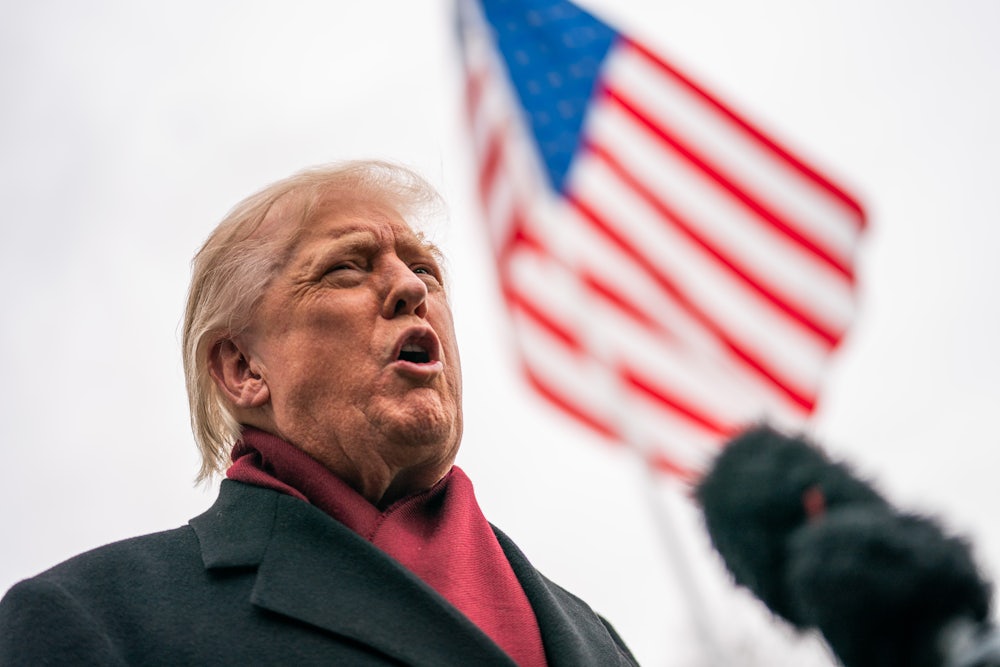Earlier this month, you may recall, President Donald Trump angrily threatened to sue the British Broadcasting Corporation for $1 billion over its use of footage of his speech just before the January 6, 2021, insurrection. Unlike Trump’s other lawsuits against media companies, this threat wasn’t entirely baseless: The BBC ended up admitting that its edit of the footage did misleadingly create the “impression of a direct call for action,” and several executives resigned, citing a need to be “transparent” about what had happened. Trump celebrated their ouster.
Now the BBC has overcorrected—albeit in the other direction. On Bluesky, historian Rutger Bregman just charged that the broadcaster cut a line from a BBC lecture he delivered, in which he described Trump as “the most openly corrupt president in American history.”
Is it really now beyond the pale for the BBC to air an accurate description of Trump’s open and explicit corruption and to correctly situate it in the American historical context? The answer, unfortunately, appears to be yes.
Asked for comment on Bregman’s charge, a spokesperson for the BBC emailed me this: “All of our programmes are required to comply with the BBC’s editorial guidelines, and we made the decision to remove one sentence from the lecture on legal advice.”
Note the admission that this edit was done “on legal advice.” Translation: Trump’s threats worked precisely as intended.
There is something deeply perverse in this outcome. Even if you grant Trump’s criticism of the edit of his January 6 speech—never mind that as the violence raged, Trump essentially sat on his hands for hours and arguably directed the mob to target his vice president—the answer to this can’t be to let Trump bully truth-telling into self-censoring silence.
That’s plainly what happened here. This was one of the BBC’s Reith Lectures—a speech, not produced programming. In it, Bregman addressed the 2024 matchup between Joe Biden and Trump, and he posted a transcript that included the line he delivered, which was omitted from the on-air broadcast. I’ve bolded that bit:
On one side we had an establishment propping up an elderly man in obvious mental decline. On the other we had a convicted reality star who now rules as the most openly corrupt president in American history. When it comes to staffing his administration, he is a modern day Caligula, the Roman emperor who wanted to make his horse a consul. He surrounds himself with loyalists, grifters, and sycophants.
In its email to me, the BBC insisted that “the integrity” of Bregman’s arguments remains “central to the broadcast.” But perhaps due to Britain’s stricter libel laws, Trump’s threat apparently got the BBC to censor something that is obviously correct. Trump is the most corrupt president in U.S. history; it’s not even a close call, and the open flaunting of his corruption and self-dealing are an essential feature of his presidency on a near-daily basis. The MAGA movement plainly thrills on exactly this. Trump and MAGA just don’t want media sources that swing voters might believe to describe his behavior as “corruption”—or worse, “criminality.”
It should go without saying that Trump’s threats and bullying—along with the corrupt uses of the power of the state as weapons against critics—are really about preventing the airing of truths that displease Trump. We just saw the Defense Department take the extraordinary step of launching an investigation into Democratic Senator Mark Kelly of Arizona over his participation in a video warning members of the military and intelligence services against following illegal orders.
In that video, Kelly and the other Democratic participants didn’t even name Trump. As Kelly pointed out to Rachel Maddow, they were merely restating what’s in the Uniform Code of Military Justice, which prohibits the carrying out of unlawful orders. “This is not about the law,” Kelly said. “It’s about intimidation.”
Indeed, as I’ve argued, there are strong grounds for believing that Trump actually has delivered illegal orders, most obviously with his bombings in the Caribbean Sea. It is that reality that Trump does not want to hear discussed. This week, Trump bizarrely tweeted out a picture of the plaque at West Point, thinking it supports his argument that those Democrats committed sedition. In fact, it describes it as a civilizational achievement that the U.S. military places loyalty to the Constitution and the law over loyalty to a “leader,” i.e., one man. Is there any feature of Trump’s presidency that’s more central than his demand for fealty to one man—himself—over the Constitution and the rule of law?
What’s perhaps most galling about the BBC edit is that even if you disagree with the assertion that Trump is the “most openly corrupt president in American history,” it’s obviously legitimate grounds for intellectual inquiry and debate. The BBC’s annual Reith Lectures have for decades featured some of the leading intellectual figures of the day, beginning with Bertrand Russell just after World War II. They are a flagship achievement of public broadcasting. To omit this explicit mention of Trump’s world-historical corruption from one of those storied lectures is an unnerving new turn in the annals of elite capitulation.






